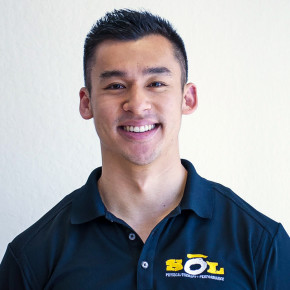7am-7pm M-F
510-462-3771

Dr. Bryan Wu believes in creating a relationship with his patients that is centered on teamwork, mutual trust and respect, excellent care, great communication, and fun. His patients can expect Bryan to listen well as they speak about their current capabilities and goals, and from there to work together to create a treatment plan that is uniquely tailored to their condition and lifestyle.
Brian has a background in sports, playing football from a very early age. His interest in physical therapy and its restorative powers became his career path after he rehabilitated two ruptured patella tendons and was back training without any limitation. Bryan knows what it will take to get patients through their injuries, prevent future injuries, and wants to work with patients to create a strategy for successful recovery.
Bryan’s approach to physical therapy is based on his belief in the inherent dignity and worth of each individual person. He has worked with patients across a wide variety of settings, from hospitals to acute rehab to outpatient orthopedics, and these experiences have refined his ability to provide specialized care for patients of all ages and activity levels.
Bryan also has a passion for learning, which means he is continually researching the best evidence-based outcomes for physical therapy treatment and taking courses to further he knowledge as a physical therapist. He is preparing to pursue further certifications in manual therapy and functional movement analysis as well as sport-specific treatments.
When Bryan isn’t helping patients achieve their highest functioning, he enjoys camping, weight training, basketball, cooking and spending time with family and friends.
Doctor of Physical Therapy. Western University of Allied Health Sciences; Bachelors of Science, Biology, UC Irvine; Selective Functional Movement Assessment (SFMA); Instrument Assisted Soft Tissue Mobilization (IASTM); Fascial Movement Taping Basic & Performance (FMT); Postural Restoration Integration for Fitness & Movement; Myofascial Decompression/Functional Cupping; Clinical Pediatric Experience; Neurodevelopmental Sequence; Proprioceptive Neuromuscular Facilitation; Dynamic Neuromuscular Stabilization (DNS)